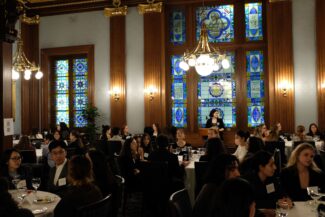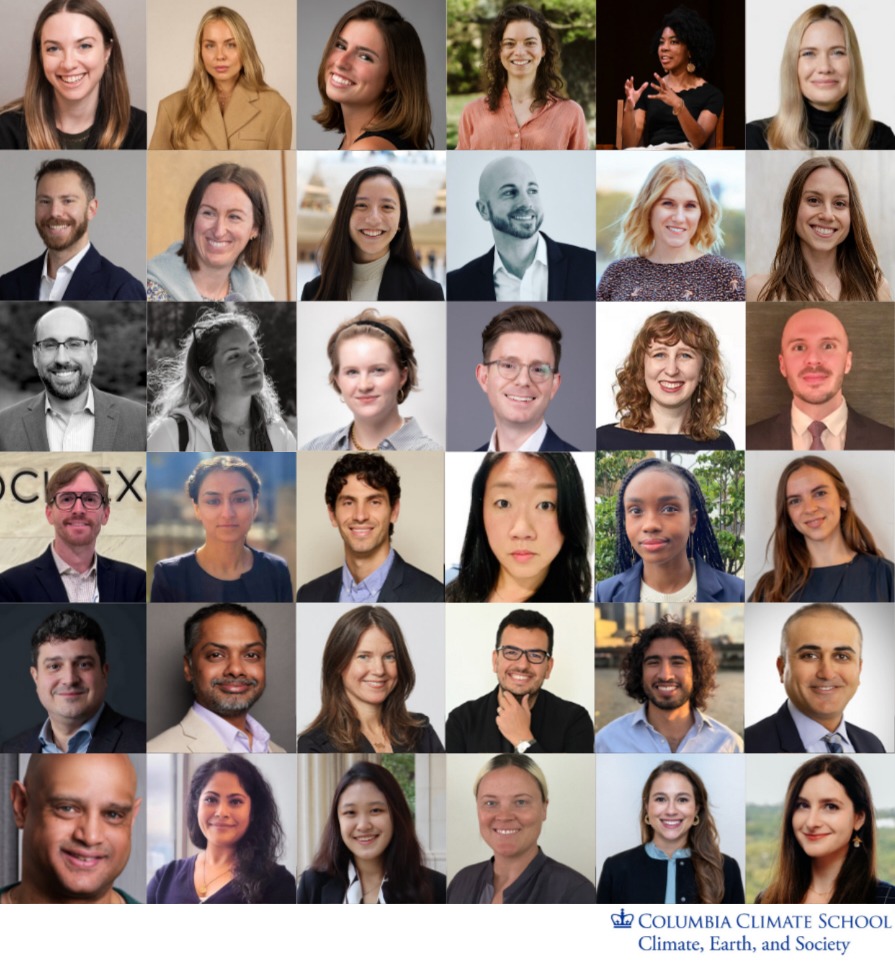On October 24, the Columbia Climate School hosted its 10th annual Sustainability Careers Reception at the Penn Club in Midtown Manhattan. The event brought together 36 professionals and over 100 Columbia students to explore the skills, roles and projects driving sustainability today.
In recent years, sustainability has become embedded in nearly every field; cities have become major climate employers and investors look for green portfolios. Across sectors, collaboration is essential and requires people who can translate between engineering and policy, finance and community needs. Events like the Sustainability Careers Reception create those connections in real time.
This yearly reception hosts students pursuing one of the Climate School’s eight educational partner programs: the Undergraduate Program in Sustainable Development, the M.P.A. in Development Practice, the M.P.A. in Environmental Science and Policy, the M.A. in Climate and Society, the M.S. in Climate, the M.S. in Climate Finance, the M.S. in Sustainability Management and the M.S. in Sustainability Science.
For the first time, roundtables were split across two rooms, creating a more intimate setting and deeper discussion. Smaller groups made it easier to ask direct questions and hear multiple perspectives during the first hour before the room opened into broader networking during the second half of the event.
Throughout the evening, the rooms buzzed with conversation as they turned into cross-sector maps. At one table, a practitioner from BNY (a global financial services company) compared financing pathways. Nearby, a FedEx sustainability lead walked through supply chains and operations.

A few feet away, a team member from JLL, a global real estate services company, discussed building performance and retrofits, while staff from the NYC Mayor’s Office of Climate and Environmental Justice (MOCEJ) and the New York State Research and Development Authority explained how city and state programs move projects from plan to delivery. “Climate work for the city is about modernizing infrastructure to make it stronger and safer for decades to come. Roads, bridges, airports, parks, the electric grid always need maintenance and improvements, so why not also make it more resilient and sustainable while we’re at it? We can do multiple things at once to benefit everyone,” Mason Hess, chief of staff of the MOCEJ, said. On the nonprofit side, voices from the Natural Resources Defense Council (NRDC) and the Rocky Mountain Institute described how advocacy and philanthropy connect to on-the-ground work. Across the rooms, finance, consulting, communications, energy, resiliency and advocacy were united for a common goal.
Students described discovery and direction as the two big outcomes of the evening. Yu Jeong Lee, a student in the M.S. in Climate Finance program, shared how the reception let her discover roles she had not heard of, hear where practitioners see momentum and think about how to make the most of her time at Columbia.
The environmental field keeps shifting, and the conversations reflected that. Students heard that the real advantage is being able to move between worlds: turning data into policy, linking operations to equity and translating science into strategy. “Talking with the students was energizing, and I left envious of the wealth of specialized programs available at the Climate School. As the clean energy transition accelerates, my advice is to lean into interdisciplinary learning: the most effective climate professionals draw fluently from science, policy and storytelling,” said Deborah Burke, program officer in sustainable development at the Rockefeller Brothers Fund.

The reception showed where climate work is headed. It sits across departments and sectors, in city offices and private firms, in philanthropy and advocacy, and in the places where those efforts meet. Students left with contacts and a clearer map for how to turn their time at Columbia into impact. Stella Hoffman Camara, a student in the M.A. in Climate and Society program, walked out of the event feeling “re-energized and even more certain about the kind of impact I want to keep making in my career.”
By the end of the night, notes scribbled on napkins had become short lists of skills to sharpen, books to read and niches to explore. When asked to reflect on the evening, Kathy Harris, director of the NRDC clean vehicle policies and programs, shared that she always looks forward to attending the Sustainability Careers Reception. “It is energizing to engage with a new generation of climate leaders who bring the passion and innovative thinking our planet urgently needs. My advice to those entering the field: stay curious, tenacious and collaborative.”
The Climate School’s Professional Development program offers students and alumni resources and programs that supplement the career services in their respective schools. The program includes skill-building seminars, networking opportunities and tools that, together, better prepare students to pursue job opportunities in sustainability. Coming up next on February 27, 2026: the Career Expo.
This article was written by Alicia Carmona Cornejo (M.P.A. in ESP) and Siri Storstein-Norgaard (B.A. in Climate Systems Science and B.A. in Anthropology, Columbia College), with contributions from Zachary Anasazi Desrosiers-Victorin (M.S. in Climate). All three are currently interning with the Office of Academic Affairs at the Columbia Climate School.
* Practitioners, from left to right and top to bottom: Rachel Aaronson (New York City Economic Development Corporation), Yulia Abdulmanova (PVH Corp.), Maya Ackell (Solar Landscape), Ana Almerini (ICF), Cameren Bullins (Rockefeller Brothers Fund), Deborah Burke (Rockefeller Brothers Fund), Philip Caine (AccountAbility), Christina Castle (DÔEN), Laura Chen (Ode Partners), Jeffrey Crawford (Azuri), Lara Croushore (Second Muse), Annie Evangelakos (JLL), Adam Freedgood (Third Partners), Valentina Guido (RMI), Caitlin Hamilton (Brookfield Renewable), Zachary Hanson (New York Power Authority), Kathy Harris (Natural Resources Defense Council), Mason Hess (NYC Mayor’s Office of Climate & Environmental Justice), Nic Iraci (Jennison Associates), Paramjot Kaur (Institutional Shareholder Services), Nick Kraft (Eurasia Group), Mina Lee Hamburg (Capgemini), Jonelle Maltay (JPMorgan Chase), Clarisa Marambio (Ambition Loop), Dylan McAuliffe (Renewable Energy Brokerage & Advisory), Viswas Nair (Capgemini), Irene Nielson (Natural Resources Defense Council), Emir Pekdemir (Atelier Ten), Anthony Perez (NYC Mayor’s Office of Climate and Environmental Justice), Rohan Poojara (PwC – Strategy&), Sameer Ranade (NYSERDA), Neeradha Ravikumar (Brookfield Properties), Ellen Ren (NYC Department of Buildings), Kenzie Schwartz (Energy and Environmental Economics, Inc.), Celena Wasserstrom (BNY), Hannah Weatherford (FedEx).
Source link
Guest news.climate.columbia.edu



